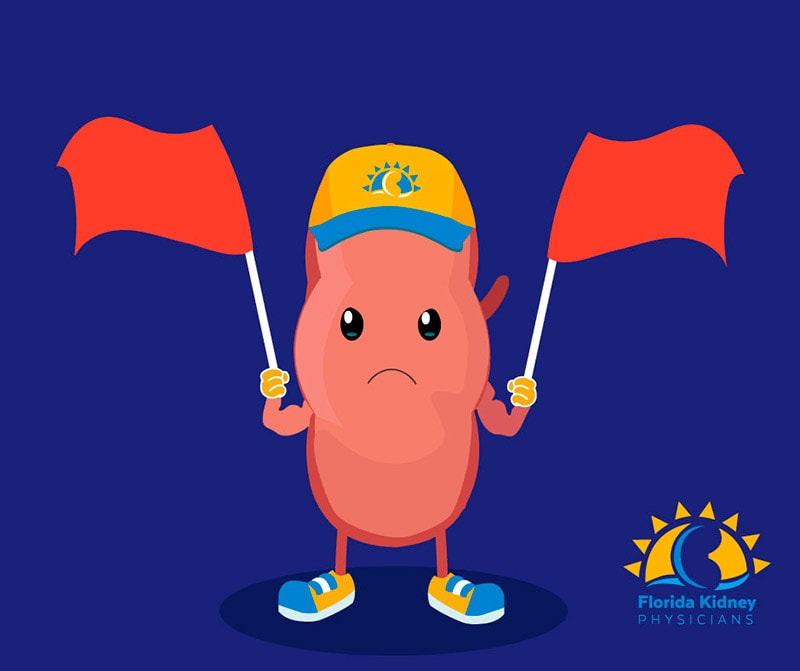The kidneys play a crucial role in your general health, so how can you tell if something is wrong with them? When should you seek advice from a nephrologist? What are the ”red flags” of kidney health?
Dr. Faizul Hussain, a nephrologist at Florida Kidney Physicians, gives a short comprehensive overview on the matter.
Kidney health self-evaluation cheat sheet
The first rule of kidney health self-evaluation is: don’t wait for scary symptoms.
In most cases, kidney diseases are silent and progress slowly, so you won’t be able to diagnose them early without running a few tests and getting examined by an experienced nephrologist.
If you have diabetes, high blood pressure, a personal or family history of kidney disorders, make sure to run at least a urinalysis and a complete blood count every few months to make sure you’re in the safe zone. Regular checkups with a nephrologist are also highly recommended.
That said, although there are dozens of signs and symptoms that could suggest a health issue of the kidneys, here’s what you should look out for in the first place. These are ”red flags” that indicate you should talk with a kidney specialist as soon as possible.
Changes in urine color, transparency, and smell
The urine of a healthy person is pale yellow, transparent, and almost odorless. A pinkish or reddish hue may indicate the presence of blood in the urine, while a greenish tone could be a sign of a bacterial infection. Cloudy non-transparent urine may be another sign of infection, but it may also suggest an abnormal level of salts in the liquid.
Pain in the lower back
The kidneys are seated against the back muscles, directly under the lower ribs. Kidney pain is often felt in the lower back, but it may also radiate to the groin, thighs, or to the sides of the abdomen. Most often, kidney pain is described as dull, but kidney stones may be accompanied by sharp, intense pain that’s worsened by movement.
Signs and symptoms of an accumulation of toxins and waste products in the body
The primary function of the kidneys is to eliminate waste products from the body. When the kidneys stop carrying out this function well, waste products are accumulated in the body and may cause nausea, vomiting, fever, brain fog, headache, lethargy, fatigue, and other non-specific symptoms.
What can cause kidney failure?
End-stage renal disease (ESRD), often called just kidney failure, is a severe impairment of the functions of the kidneys. It’s impossible to live long with kidney failure, so dialysis or a kidney transplant are the only ways to survive the condition.
But what are the leading causes of kidney failure in the first place?
Here’s a quick list of conditions to be aware of:
- Diabetes
- Poorly controlled high blood pressure
- Chronic conditions of the urinary tract
- Genetic disorders
- Autoimmune diseases
- Severe bleeding
- Extremely low blood pressure
- Heart failure
- Kidney-damaging toxins, including illegal drugs
- Kidney trauma
- Blood clots that block the circulation of blood in or near the kidneys
Is coffee bad for your kidneys?
According to the common opinion, you shouldn’t drink too much coffee if you have any kind of health condition of the kidneys. After all, caffeine can temporarily increase your blood pressure, which means more blood will be pumped through the kidneys. Theoretically, if the kidneys aren’t very strong, this extra work could further impair their condition.
However, recent studies indicate that coffee may actually improve kidney health.
- In 2017, a huge meta-analysis failed to establish a link between coffee consumption and chronic liver disease in males, with a possible inverse association in females.
- A study from 2018 reported that coffee intake may be associated with a lower risk of developing chronic kidney disease. Another study from 2018 also highlighted that higher amounts of coffee were linked to lower risks.
- A recent study from 2019 found no link between coffee consumption and mortality in patients with chronic kidney conditions.
To summarize, coffee doesn’t seem to be dangerous for the kidneys, but it wouldn’t be a wise idea to drink too much of it nevertheless. Everything is good in moderation, after all!
Conclusion
After reading this post, you should have a good idea on how to tell if your kidneys are strong and healthy or if you’d better talk to a nephrologist soon. For more insights and a personal consultation, don’t hesitate to reach out to one of our kidney specialists at Florida Kidney Physicians. We’ll be excited to talk to you!

